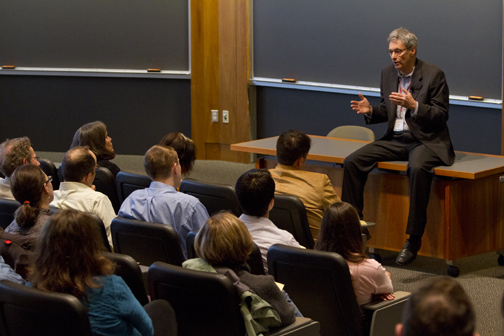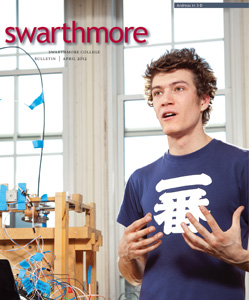Lax Conference Was Inspiring
Despite overcast skies, a bright atmosphere suffused the Science Center’s Eldridge Commons on March 18, as 125 excited students, alumni, faculty, administrators, and friends excitedly gathered for the 13th annual Jonathan R. Lax ’71 Conference on Entrepreneurship. Lax was a lifelong entrepreneur who ran a mutual fund from his dorm room and later designed a surge protector for computers, among many other activities; his 1996 bequest to the College funds this forum.
Alluding to the fact that many other liberal arts colleges are just beginning to focus on entrepreneurship, President Rebecca Chopp said in her introductory remarks, “I take pride that we have been having this conference for so many years, reflective of the large number of entrepreneurs we have in our alumni body.”
The confluence of entrepreneurship and environmental concerns was an implied theme this year. Attendee Carr Everbach, professor of engineering, noted, “Though not everyone who attended was focused on climate change, the sustainability theme ran through many of the panel discussions.”
Keynote speaker David Gelber ’63 is something of an accidental entrepreneur. A multi-award-winning producer at 60 Minutes until leaving a year ago to launch a new series, he has decided that something needs to be done about climate change, an issue he believes is by far the most urgent and neglected of our age.
His ambitious idea is to create a new television show whose goal will be to humanize the global warming issue—showing how it affects people on a personal level, including its impact on individual health.
“We know how to tell stories on television,” he says, and he plans to get unexpected people to tell them. These include a major NASCAR driver and an evangelical climate scientist. He also quickly realized that he will need “a 20-year-old” to help him spread the word through social media, and by developing a complementary interactive website, dedicated YouTube channel, and online games.
To accomplish his objective, Gelber had to undergo a crash course in entrepreneurship, acknowledging that many others at the conference had far more experience in this area than he. But he repeated an encouraging remark made at Chopp’s pre-conference dinner by fellow panelist Reuben Canada ’99: “Entrepreneurship isn’t just about starting a business; it’s about getting what you want out of life.” And this is exactly what Gelber wants to be doing with his life now.
After his well-received speech and an extended question-and-answer period, the conference broke into two entrepreneur-led panels. One panel explored Twists, Turns and Rewards of Entrepreneurial Success, and the addressed Who Really Makes It as an Entrepreneur: Can You?
Davia Temin ’74, one of three speakers for the second panel, says the Quaker phrase “Let your life speak” has informed her work as president and CEO of her company, which strives to enhance and save reputations of corporations and other institutions.
The second panel’s other two speakers were Phil Weiser ’90, dean of the University of Colorado Law School and co-chair of Startup Colorado, and Seattle-based Menno van Wyk ’67. Weiser indicated that the College’s emphasis on interdisciplinary work is a natural complement to entrepreneurship, while van Wyk emphasized the importance of serendipity and resilience gained through experience. Among other businesses, he developed a successful outdoor footwear company.

Participants in the 13th annual Jonathan R. Lax ’71 Conference on Entrepreneurship posed many questions for the panelists.
Following the discussions, conference attendees broke into roundtable discussions with entrepreneur participants. Engineering and physics double major Ari Novack ’12 found the conversation group titled From Swarthmore to a Technology Entrepreneur, led by medical technology startup CEO Brian Heaney ’83, to be the most useful part of the conference for him. “I was able to get a better picture of where I see myself headed,” says Novack.
Attendee Antony Kaguara ’15 hopes that alumni panelists will become part of a resource pool for talks sponsored by the Swarthmore Entrepreneurship Club, of which he is a member. To Kaguara, the day’s events were “nothing short of inspiring,” an assessment reinforced by former panelist Amity Cox ’99, a partner at Serendip Ventures, who notes that the energy of young entrepreneurs “really brings life to the conference.”
The gathering came full circle, ending as it had begun, with increasingly noisy networking, a clear sign of engagement. Refreshing samples of Jin-Ja, a new green-tea-based drink developed by participant Canada, were eagerly consumed.
By the time the conference ended, the skies had cleared and the spring-like weather was full of promise despite the unseasonable warmth. The weather was a visceral reminder that Swarthmoreans of all types are using their considerable entrepreneurial, intellectual and technological skills, along with their College-honed capacity for persistence and hard work, to vigorously confront the ultimate global challenge of climate change.
 Email This Page
Email This Page
